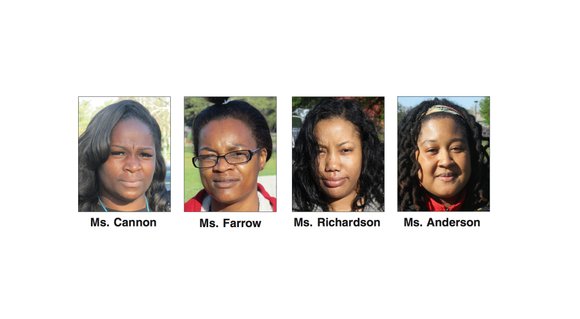RPS threatens to close 5 schools
Joey Matthews | 4/8/2016, 6:52 a.m.
“It’s ridiculous.”
That was the response Wednesday from Jakela Cannon, the mother of a John B. Cary Elementary School kindergarten student in the West End, to a cost-cutting plan introduced this week by the Richmond Public Schools administration that seeks to close Cary, three other elementary schools and Armstrong High School.
The proposal would move those students to other existing schools in the district and consolidate three unidentified alternative schools into one.
Ms. Cannon and other RPS parents told the Free Press they are concerned the school closures and consolidation plan could lead to overcrowded classes, increased incidents of violence among students and leave adults struggling to find transportation for their children to more distant schools.
“This is a wonderful school,” Ms. Cannon said of Cary Elementary. “We have great teachers, staff and students here. If they have to go somewhere else, it’s going to be overcrowded and it’s going to be inconvenient because I live near here and I don’t want my son to have to ride the bus to school.”
Aishah Farrow, stepmother of a Cary first-grader, predicted worse could occur as she dropped the child off at school. “It could lead to more kids fighting because they’re forced to attend overcrowded schools.”
The plan was tendered by RPS assistant superintendents Tommy Kranz and Ralph Westbay at Monday’s Richmond School Board meeting at City Hall.
It also calls for the closure of Overby-Sheppard Elementary in North Side and Swansboro and Southampton elementary schools in South Side.
The plan was touted as a means to save the district money by closing schools with too many empty desks. Overby-Sheppard students would move to Clark Springs Elementary, Swansboro students to Blackwell Elementary, John B. Cary students to Carver Elementary and Southampton students to Elizabeth D. Redd or J.B. Fisher elementary schools.
Additionally, the proposal calls for the closure of Armstrong, one of the first high schools in the state to be founded for African-American students in the early 1870s.
Mr. Kranz and Mr. Westbay indicated the proposal was not set in stone and was only a possible worst-case-scenario solution if the city fails to provide additional funds sufficient to meet the district’s current needs.
City Council must approve the appropriation for schools by May 15, according to state law, but usually does so at least a few days earlier.
School Board Vice Chair Donald Coleman, an Armstrong High alumnus whose 7th District includes the school, lamented the economic realities that have the board considering closing the historic school that has served as the educational foundation and springboard for such esteemed alumni as former Gov. L. Douglas Wilder, banker Maggie L. Walker and William Ferguson Reid, the first African-American elected to the Virginia General Assembly in the 20th century.
“We’ve come to a situation where probably the most historic African-American school in the city of Richmond” is being considered for closure, Mr. Coleman said. “The thought that the name would no longer be on a functioning building is very sobering.
“And from a fiscal perspective, this helps us recognize the urgency of trying to figure out the fiscal piece of this that has us considering closing a school like Armstrong. It’s going to have to be fully justifiable that we couldn’t figure out a way around it.”
Cheryl Richardson said her son in pre-kindergarten became distraught when she explained to him that his school, Overby-Sheppard Elementary, could be closed.
“After I told him, he got mad and started kicking the backseat of the car and yelling, ‘No! No! No!’ ” she recalled.
“What upset me,” she added, “is that I wanted my son to have a stable education from pre-K through the fifth grade. I don’t want to uproot him from his friends and teachers, those who know he has ADHD, and know what helps him.”
Tiffany Anderson, an Overby-Sheppard PTA member whose third-grade daughter is in the gifted and talented program known as SPACE, or Special Program for Academic or Creative Excellence, took a more neutral position.
“I’m not for or against it,” she said outside the school Wednesday.
“It may be necessary,” she said of the cost cutting, “because you may have to do with less money.
“It’s not about the building,” she added. “It’s about what’s inside the building, the quality of the teachers, the behavioral programs they offer and other educational tools they offer.”
RPS officials have estimated they could save $3 million by closing and consolidating the schools.
They are seeking cost-cutting measures to close a $18 million budget gap for fiscal year 2017 in order to fully fund Superintendent Dana T. Bedden’s academic improvement plan and provide pay raises for teachers and other staff.
They are proposing the reduction steps after Mayor Dwight C. Jones proposed level funding for the district in his budget proposal and City Council members indicated they could not provide an additional $18 million in funding to the district for operations.
In recent weeks, RPS leaders also have proposed other cost reduction measures, such as increasing the student-to-teacher ratio in classes, privatizing custodial services, closing some administrative sites and eliminating inefficiencies.
“We find ourselves in a very, very dangerous game of chicken with the City Council,” School Board Chair Jeffrey M. Bourne said at Monday’s meeting. “It would be a dereliction of duty if the School Board waited until the City Council” acted before opening “the difficult dialogue,” he added.
Richmond Education Association President Charlotte Hayer praised Mr. Bourne for addressing the seriousness of the budget discussion.
“All things considered, I will say that I am glad that Mr. Bourne expressed the need for them to be proactive and start looking at options now, as opposed to waiting to see what City Council will give them,” she said. “That would take precious time that we really don’t have.”







